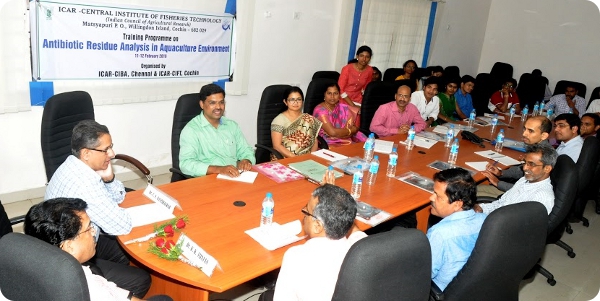A two days’ workshop on antibiotic residue analysis in aquaculture environment was jointly organized by CIBA and CIFT on 11th and 12th February 2016 at CIFT, Cochin, under the All India Network Project on Fish Health. Principal Investigators and the Research Associates/Senior Research Fellows from the partnering ICAR institutions, CIFT, CIFA, CMFRI, CIFRI, CIFE, DCFR and WBUFAS participated in the workshop. The project objectives were to classify the drugs used in aquaculture and evaluate performance. Project is also envisaged to popularize the better management practices, biosecurity and HACCP principles and analyze the economic loss due to diseases.
During the technical session, Dr T.V. Sankar, Principal Scientist and Head, Quality Assurance and Management Division (QAMD) CIFT, highlighted the importance of the collaboration of this project and data sharing between the institutes to bring out a solution for the prevention of antibiotics in the aquaculture sector. Dr P.K. Patil, Senior Scientist, CIBA and Project Coordinator, AINP-FH mentioned that the interface between industry and research institutes opens up a new avenue in this sector to check the drug residues in aquaculture. Dr Patil in his presentation on “Use of drugs in aquaculture”, pointed out on the drug safety to target animals, their efficacy and withdrawal periods. Developing methodology for drug use for important species and environmental conditions, documenting drugs used in aquaculture and developing advisory on applications in aquaculture are important components of major ICAR projects. Dr K. Ashok Kumar, Principal Scientist, ICAR-CIFT, Cochin in his presentation on “Development of LC-MS/MS method for detection of antibiotics residues in aquatic samples” emphasized sample preparation methods, the efficacy of sample extractions and importance of detection of epimers in certain antibiotics such as oxytetracycline. He also explained the principle and instrumentation of LC-MS/MS. In addition, an innovative method for detecting multiple antibiotics was also briefed. The new methodology is expected to reduce sample requirement and also bring down the cost of analysis. During the workshop, the practical session conducted by Dr Ashok Kumar included the methods of sample preparation and demonstration of antibiotic residue analysis by LC-MS/MS. At the end of the meeting Dr P.K.Patil, thanked Directors of CIBA and CIFT, Organizers, PIs of all partnering institutions, scholars and every participant for their efforts.
Earlier Dr C.N. Ravisankar, Director, CIFT welcome the delegates and congratulated CIBA for its efforts in coordinating the project effectively and also highlighted the need for residue analysis in aquaculture. Dr K.K.Vijayan, Director, ICAR-CIBA, Chennai inaugurated the workshop and in his address emphasized joint effort of participating ICAR institutes will be helpful to get scientific data required for developing policies and regulations on drug usage in aquaculture in the country. Further, he stressed the importance of traceability of antibiotics in all stages from hatchery to processing units.



